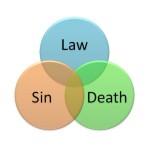This month includes a Friday 13th.
It also includes a Friday 20th, but that date never seems to get any special attention. Though difficult to spell, we are all aware of paraskevidekatriphobia: fear of Friday the thirteenth.
Christians are to be people who know the Spirit, but also know the foolishness of superstition. Christian preaching caused a riot, led by a silversmith who made lucky charms – he could see his business withering (Acts 19:23-41). Before Israel reached the land of promise, they were warned against charms (Deuteronomy 18:10-12).
So I well know that Friday 13th is dumb.
Why, then, does it still register? Why does it always cross my mind that there could be an unlucky day, when I know it’s rubbish?
That’s not the only example. Without following the superstitions, I still note: when a black cat crosses my path; when there’s a ladder I could walk under; when Australian cricketers are on a score of 87. All folly – and all still in my mind.
I think this is a clear example of what each Christian struggles with: the persistence of sin and folly.
In Philippians 3, Paul warns against false teachers in church, those who would enslave us to laws and pride. Paul himself was the perfect candidate for such empty confidence, but he gave up all his ‘achievements’ in order to know Christ.
But note how Paul admits his ongoing weakness and failure. He’s not yet there:
not that I have already attained this or am already perfect
I do not consider that I have made it my own
I press on towards the goal
Do you struggle with sin? Does persistent error get you down? That’s normal! What’s not normal is thinking the Christian life is easy and always godly. Jesus will complete his remodelling of everyone who trusts him, but renovation is always messy.
So how about we use Friday 13th as a fun reminder. Let’s laugh at the folly of thinking one number can affect us (but only on a Friday), as we laugh at the folly of our own sin. And let’s remember to ‘press on towards the goal for the prize of the upward call of God in Christ Jesus’.

